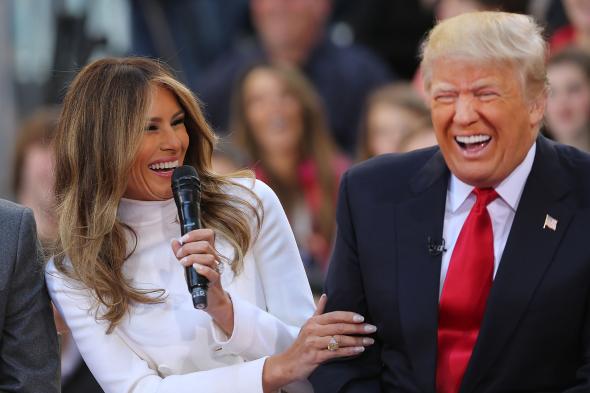The aspiring first lady Melania Trump has said startlingly little during this interminable campaign season, and when she does speak, she has defined herself time and again as someone who does not criticize, find fault, annoy, or irritate her husband. She told Julia Ioffe in a recent GQ profile that she is not “needy” or “nagging.” In Lauren Collins’ New Yorker profile, Trump reminded us that she is “not that kind of wife who would say, ‘Learn this’ or ‘Learn that,’ ”; she was referring to the fact that Donald has never learned to speak Slovenian, her native tongue. “I’m not a nagging wife,” she stressed.
Even seemingly evolved men might be envious of Donald for his non-nagging wife. And anyway, who wants to be the person who harangues anybody about the dishes, the dirty laundry, the buying of toilet paper, the changing of light bulbs, the scheduling of doctor’s appointments? But wait—would Melania Trump, with all her wealth and staff support, ever actually need to nag her husband about any of the usual naggy things? (Learning to speak Slovenian doesn’t count!) Instead of transcending the nag stereotype, has Melania simply been excused from it due to pure economics?
“It seems like wealth could buy you a pass from a nagging dynamic because much of the housework is outsourced,” says Wednesday Martin, who wrote a best-selling book about wealthy women with young children called Primates of Park Avenue.” “But really, using the term ‘nagging’ is just way to denigrate a woman with an agenda.”
In short, Melania doesn’t nag because she doesn’t ask her husband to do anything. “There’s a lot of women out there that demand that the husband act like the wife, and you know, there’s a lot of husbands that listen to that,” Donald Trump said in an interview shortly after he and Melania were married. As Melania put it, “We know our roles … he didn’t change diapers.”
Those couples aiming for a more egalitarian model—or maybe just any couple in a middle-class, two-income household—often find themselves in the midst of what Time magazine in a 2011 cover story called the “chore wars,” or what Donald Trump might call a nag-a-thon.
But as it turns out, couples today value pulling equal weight around the house. Sixty-two percent of adults say sharing household chores is very important to marital success, according to the Pew Research Center. But things are a long way from becoming equal: The 2013 American Time Use Survey found that employed married women spend almost twice as much time on housework and child care (2.6 hours a day) as their husbands do (1.4 hours a day). While men are pitching in more (the amount of housework done by men has doubled between 1976 and 2005, according to the Institute for Social Research at the University of Michigan), women still have a longer second shift, which might leave them to grumble and carp—that is, nag—about what they need taken off their plate. Alternatively, they might find fault in their husband’s handling of the housework. One study pointed out that men and women have different ideas of what clean actually looks like—the wife thinks the counter is streaky, and her husband sees a spotless surface.
It’s all enough to make any woman indulge in the fantasy of having a staff like Melania’s—she “only” has a personal chef and a personal assistant, she says—and what it could do to lessen marital strife. But Martin, who has spent a lot of time in the 1 percent bubble, says it’s important to remember that “in arrangements like Melania’s, where the man controls the resources and the woman is economically dependent, men still have the power to ignore female input.”
Nagging—which we could also frame simply as women asking for what they want—might be part of the price of the road to equality. Consider the Obamas, whose marriage has been hailed as one of two equals. It’s been reported that Michelle calls out the two-term president and Nobel laureate on his faults and tells him to pick up his dirty socks. That has probably been very good for the country.
